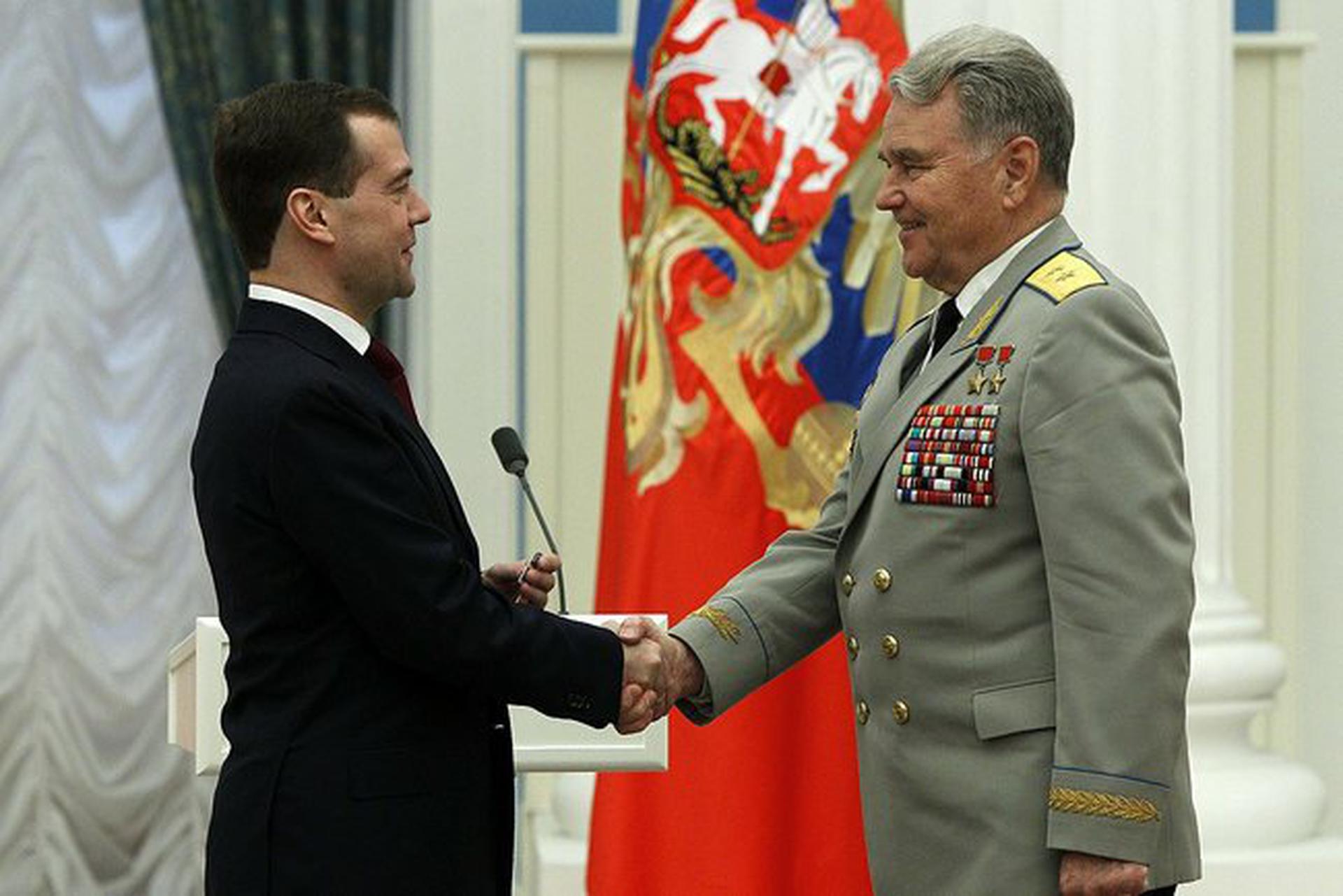Vladimir Shatalov
Russian - (RFSA)
Deceased
Date of Birth: Dec. 8, 1927
Date of Death: June 15, 2021
Vladimir Aleksandrovich Shatalov (Russian: Владимир Александрович Шаталов; born December 8, 1927) was a Soviet cosmonaut who flew three space missions of the Soyuz programme: Soyuz 4, Soyuz 8, and Soyuz 10. Shatalov was born in Petropavlovsk. From 1971 to 1987, he was Commander of Cosmonaut Training, and Director of the Cosmonaut Training Centre from then until 1991. Quote: "When we look into the sky it seems to us to be endless. We breathe without thinking about it, as is natural... and then you sit aboard a spacecraft, you tear away from Earth, and within ten minutes you have been carried straight through the layer of air, and beyond there is nothing! The 'boundless' blue sky, the ocean which gives us breath and protects us from endless black and death, is but an infinitesimally thin film. How dangerous it is to threaten even the smallest part of this gossamer covering, this conserver of life."
Soyuz | Soyuz 4
Russian Federal Space Agency (ROSCOSMOS) | RussiaBaikonur Cosmodrome, Republic of Kazakhstan
Jan. 14, 1969, 7:30 a.m.
Status: Success
Mission:
Soyuz 4 mission started with the launch on January 14, 1969, 07:30:00 UTC, carrying Commander Vladimir Shatalov, Flight Engineer Aleksei Yeliseyev and Research Engineer Yevgeny Khrunov into orbit. Two days later mission achieved the first ever docking of two crewed spacecrafts, having Soyuz 4 docked with Soyuz 5 spacecraft. Since no connecting tunel had been developed yet, the two cosmonauts had to spacewalk from one vehicle to another. The mission concluded with a safe landing back on Earth on January 17, 1969, 06:50:47 UTC.
Low Earth OrbitSoyuz | Soyuz 8
Russian Federal Space Agency (ROSCOSMOS) | RussiaBaikonur Cosmodrome, Republic of Kazakhstan
Oct. 13, 1969, 10:19 a.m.
Status: Success
Mission:
Soyuz 8 was a joint mission with Soyuz 6 and Soyuz 7 that saw three spacecraft in orbit together at the same time. It prime mission was to dock and transfer crew to Soyuz 7 but the mission failed due to docking system failure. Soyuz 8 was Commanded by Vladimir Shatalov and Flight Engineer Aleksei Yeliseyev.
Low Earth OrbitSoyuz | Soyuz 10
Russian Federal Space Agency (ROSCOSMOS) | RussiaBaikonur Cosmodrome, Republic of Kazakhstan
April 22, 1971, 11:54 p.m.
Status: Success
Mission:
Soyuz 10 launched on 22 April 1971, 23:54:06 UTC. It carried commander Vladimir Shatalov, flight engineer Aleksei Yeliseyev and test engineer Nikolai Rukavishnikov into orbit. Flight was intended to become the world's first mission to the world's first space station, Salyut-1. Docking was not successful, and crew didn't enter the station. Crew returned to Earth, landing on 24 April 1971, 23:40 UTC.
Low Earth OrbitThe Roscosmos State Corporation for Space Activities, commonly known as Roscosmos, is the governmental body responsible for the space science program of the Russian Federation and general aerospace research. Soyuz has many launch locations the Russian sites are Baikonur, Plesetsk and Vostochny however Ariane also purchases the vehicle and launches it from French Guiana.
KAIROS
Flight 3
Space One Launch Pad - Spaceport Kii, JapanThird flight of the KAIROS launch vehicle. 5 satellites will be on board: * TATARA-1R * SC-Sat1a * HErO * AETS-1 * Nutsat-3 (TASA/Taiwan)
Falcon 9
Starlink Group 10-40
Space Launch Complex 40 - Cape Canaveral SFS, FL, USAA batch of 29 satellites for the Starlink mega-constellation - SpaceX's project for space-based Internet communication system.
Falcon 9
Starlink Group 10-41
Space Launch Complex 40 - Cape Canaveral SFS, FL, USAA batch of 29 satellites for the Starlink mega-constellation - SpaceX's project for space-based Internet communication system.
Falcon 9
Starlink Group 17-23
Space Launch Complex 4E - Vandenberg SFB, CA, USAA batch of 25 satellites for the Starlink mega-constellation - SpaceX's project for space-based Internet communication system.
Electron
That's Not A Knife (DART AE)
Rocket Lab Launch Complex 2 (Launch Area 0 C) - Wallops Flight Facility, Virginia, USAPayload is a scramjet-powered hypersonic vehicle developed by by Australian company Hypersonix.


